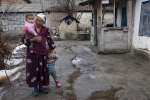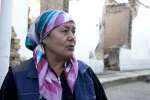Q&A: Abidjan meeting brings hope for stateless people in West Africa
News Stories, 17 February 2015
ABIDJAN, Côte d'Ivoire, February 17 (UNHCR) – Next week, Côte d'Ivoire will host a high-level regional meeting on the situation and future of hundreds of thousands of people who struggle to get by without a nationality in West Africa. The UN refugee agency, which will be represented by High Commissioner for Refugees António Guterres, estimates that some 750,000 of the world's 10 million stateless people live in West Africa, mostly in Côte d'Ivoire. Without a nationality, many cannot access the rights that most people take for granted, including freedom to travel, work, access education and health care, marry and more. Last November, UNHCR launched a campaign, #IBelong, to end statelessness across the globe by 2024. Mohamed Askia Touré, who represents UNHCR in Abidjan, spoke to Associate Public Information Officer Nora Sturm about the meeting and efforts to end statelessness in Côte d'Ivoire. Excerpts from the interview:
The meeting will be held from February 23-25, but why in Côte d'Ivoire?
For several reasons: First and foremost, the government of Côte d'Ivoire has made real strides in fighting against statelessness within its borders. In addition to acceding to the two international conventions [of 1954 and 1961] on statelessness in late 2013, the Ivorian authorities have implemented a number of important measures that show their political will to eradicate the problem. In particular, the government reformed the nationality law in 2013, and in April last year launched a programme allowing eligible people to acquire Ivorian nationality through declaration.
Tell us more about this programme
It gives people with relevant ties to Côte d'Ivoire an opportunity to apply for citizenship. This includes many stateless people or people at risk of becoming stateless. For instance, those who lived or were born in Côte d'Ivoire before independence in 1960 and have continuously resided in this country, as well as their descendants, are eligible to acquire Ivorian nationality. The government is also implementing important activities aimed at reducing the risk of statelessness, including through mobile courts that deliver late birth certificates, nationality certificates and identity cards.
Is statelessness a big issue for Côte d'Ivoire?
Yes. Côte d'Ivoire is the West African state with the highest estimated number of stateless people or people at risk of statelessness . . . The Ivorian government estimates that 700,000 people living in the country are stateless or of undetermined nationality. Although this figure is an estimate . . . it reveals that there are people in Côte d'Ivoire who are stateless and who should benefit from protection and assistance from the government and from UNHCR. Despite improvements, there is still work to be done in Côte d'Ivoire to address gaps in the country's nationality legislation that continue to create cases of statelessness, as well as other obstacles to the acquisition of nationality. By holding the conference in Côte d'Ivoire, the Ivorian government and UNHCR [with the Economic Community of West African States, or ECOWAS] are signalling their commitment to work together to address this problem.
Who does statelessness affect in Côte d'Ivoire, and why?
People who are stateless or at risk of statelessness in Côte d'Ivoire fall into several broad categories: first, you have individuals who were abandoned as children and who are of unknown parentage and not considered as nationals under Ivorian law. They are highly unlikely to have their births registered. Given the lack of ties and the inability to prove parentage, it is impossible to legally establish the nationality of these children.
Then you have historical migrants and their descendants from neighbouring countries – that is, individuals who themselves, or whose parents or grandparents, migrated to Côte d'Ivoire before or just after independence in 1960 and who did not establish their nationality at independence or before the nationality law changed in 1972. For instance, Côte d'Ivoire received many families from Burkina Faso around the time of independence who came to work in the cocoa and coffee plantations.
Who else is at risk?
Other populations at risk of statelessness in Côte d'Ivoire include: migrants in the sub-region who do not have documents to prove their connection to their country of origin – this risk increases as they have children and pass on the status. Also at risk are individuals who were naturalized in Côte d'Ivoire but who cannot produce proof of their nationality . . . or whose personal details are different from those in the official records; and finally some trans-border groups, such as pastoralists and the Lobi community in the north of the country.
How will UNHCR help Côte d'Ivoire end statelessness by 2024?
UNHCR will focus on activities aimed at increasing the rate of birth registration and at improving the country's civil status system. UNHCR will help the government in raising awareness on the importance of birth registration as well as on the concept of statelessness and its consequences. We will also help the government to build the capacities of community leaders and traditional chiefs involved in disseminating information on birth registration and processes to acquire nationality. We will also support the local authorities by providing training on implementation of the civil status code and provisions regarding the acquisition of nationality. Finally, we will run courses on statelessness for local journalists, who play a key role in raising awareness and shaping public opinion.
Had you worked on statelessness before coming to Côte d'Ivoire last year?
I have long been interested in the issue of statelessness from a human rights perspective and first worked on the topic in Asia, especially in Bangladesh, Nepal and Myanmar, where the problem is particularly severe. Working on statelessness is a priority for our office in Côte d'Ivoire. Unlike in many other countries, statelessness here is not so much due to discriminatory governmental practices, but rather to gaps in nationality legislation and administrative procedures, the decolonization process, and historical and contemporary migration patterns.
The different causes notwithstanding, the problem in Côte d'Ivoire needs to be addressed through a long-term and durable approach. It is difficult to imagine what it means to be in a legal no man's land – but the essence of this status is that without a nationality, all other rights are greatly threatened. We are committed to giving the problem the attention it deserves so that the thousands of people in Côte d'Ivoire whose nationality is currently undetermined receive the necessary protection and are assisted in obtaining a national identity.






































